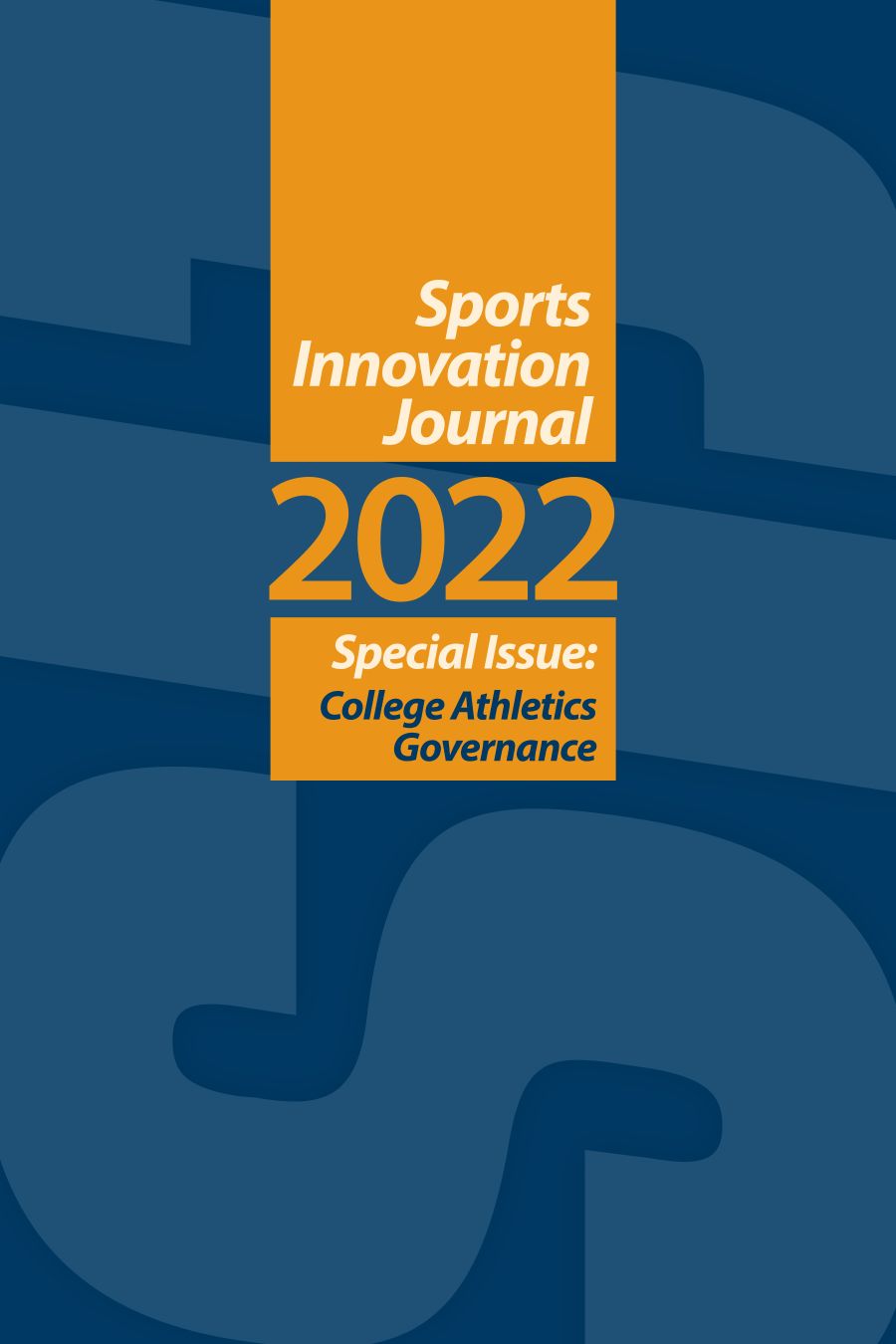“He’s an Asshole”
Power 5 College Football Athletes Navigating a “Shady” Coaching Transition
DOI:
https://doi.org/10.18060/25995Keywords:
college athletes, football, coaching transition, athlete experience, transition theoryAbstract
Head coaches play a crucial role in shaping both athletes’ athletic experiences and the complex team system. Consequently, coaching transitions have tremendous impacts on college athletes. Through the lens of transition theory, the purpose of this case study was to investigate the effect of multiple head coaching changes on NCAA Division I Power Five football athletes. Eight football athletes completed a 27-item open-ended questionnaire. Data analysis revealed three explicit, meaningful themes: support, achievement, and consistency. This study strived to assist athletic administrators and coaches in becoming increasingly aware of the potential impact that these abrupt coaching transitions can have on the athlete experience. Additionally, through the voices of the participants, this study attempted to assist college athletes in navigating a coaching transition.
References
Anderson, M., Goodman, J., & Schlossberg, N. K. (2011). Counseling adults in transition: Linking Schlossberg’s theory with practice in a diverse world. Springer Publishing.
Andrew, D. P., Martinez, J. M., & Flavell, S. (2016). Examining college choice among NCAA student-athletes: An exploration of gender differences. Journal of Contemporary Athletics, 10(3), 201.
Barclay, S. R. (2017). Schlossberg’s transition theory. In W. K. Killiam, & S. Degges-White (Eds.), College student development: Applying theory to practice on the diverse campus (pp. 23-34). Springer Publishing.
Becker, A. J. (2009). It's not what they do, it's how they do it: Athlete experiences of great coaching. International Journal of Sports Science & Coaching, 4(1), 93-119.
Bender, B. (2021a, February 11). College football coach carousel: Every FBS coaching change in 2020. Sporting News. https://www.sportingnews.com/us/ncaa-football/list/college-football-coach-carousel-2020-fbs-coaching-changes/1j4ijvf0fsyzy1359p0ns4u646
Bender, B. (2021b, December 10). College football coaching carousel: Every FBS coaching change in 2021. Sporting News. https://www.sportingnews.com/us/ncaa-football/news/college-football-coach-carousel-2021-fbs-change/1a4hp96yv3as81evidmgobko07
Creswell, J. W., & Poth, C. N. (2018). Qualitative inquiry and research design: Choosing among five approaches. Sage Publishing.
Eidelson, R. J. (1997). Complex adaptive systems in the behavioral and social sciences. Review of General Psychology, 1(1), 42-71.
Gamson, W. A., & Scotch, N. A. (1964). Scapegoating in baseball. American Journal of Sociology, 70(1), 69-72.
Gilson, T.A., Paule-Koba, A. L., & Heller, E.A. (2013). The social-psychological implications of a coaching change at the collegiate level: Perceptions of athletes. Journal of Intercollegiate Sport, 6(2), 164-178.
Goodson, J., & Anderson, M. L. (2012). Applying Schlossberg’s 4-S transition model to retirement. Career Planning & Adult Development Journal, 28(2), 10-20.
Grusky, O. (1963). Managerial succession and organizational effectiveness. American Journal of Sociology, 69(1), 21-31.
Harry, M. & Weight, E. (2021). Post-collegiate athlete transitions and the influence of a coach. Journal for the Study of Sports and Athletes in Education, 15(2), 1-26.
Hatteberg, S. (2018). Under surveillance: College athletics as a total institution. Sociology of Sport Journal, 35(2), 149-158.
Heller, E.A., Gilson T.A., & Paule-Koba, A. (2016). “So, who’s our new coach?”: NCAA student athletes’ perceptions after a head coaching change. The Sport Journal, 19(1), 1-16.
Hersch, P. L. (2012). Does the NCAA coaching carousel hamper the professional prospects of college football recruits? Journal of Sports Economics, 13(1), 20-33.
Hosick, M. B. (2021, April 15). DI council adopts new transfer legislation. NCAA.org. https://www.ncaa.org/about/resources/media-center/news/di-council-adopts-new-transfer-legislation
Johnson, J. E., Pierce, D. A., Tracy, D. R., & Ridley, M. J. (2015). The influence of football head coaching change in the football championship subdivision: An evaluation of the NCAA academic progress rate. Journal of Sport Behavior, 38(1), 26-51.
Jowett, S. (2005). On repairing and enhancing the coach-athlete relationship. In S. Jowett & M. Jones (Eds.), The psychology of coaching, (pp. 14-26). The British Psychological Society, Sport and Exercise Psychology Division.
Jowett, S. (2006). Interpersonal and structural features of Greek coach–athlete dyads performing in individual sports. Journal of Applied Sport Psychology, 18(1), 69-81.
Jowett, S. (2007). Interdependence analysis and the 3+1Cs in the coach-athlete relationship. In S. Jowette & D. Lavallee (Eds.), Social Psychology in Sport (p. 15–27). Human Kinetics.
Jowett, S. (2009). Validating coach-athlete relationship measures with the nomological network. Measurement in Physical Education and Exercise Science, 13(1), 34-51.
Maxwell, J.A. (2013). A realist approach for qualitative research. Sage Publications.
Park, S., Todd, D., & Lavallee, D. (2012). Exploring the retirement from sport decision-making process based on the transtheoretical model. Psychology of Sport and Exercise, 13(4), 444-453.
Pate, J. R., Stokowski, S., & Hardin, R. (2011). Third time’s a charm: The case of Tennessee’s four junior football players who endured three different head coaches in three seasons. Journal of Issues in Intercollegiate Athletics, 4(1), 354-369.
Ravitch, S.M., & Mittenfelner-Carl, N. C. (2016). Qualitative research: Bridging the conceptual, theoretical, and methodological. Sage Publications.
Rubin, L. M. & Moses, R. A. (2017). Athletic subculture within student-athlete academic centers. Sociology of Sport Journal, 34(4), 317-328.
Schlossberg, N. K. (2008). Overwhelmed: Coping with life’s ups and downs. M. Evans.
Shipherd, A. M., Wakefield, J. C., Stokowski, S., & Filho, E. (2019). The influence of coach turnover on student-athletes' affective states and team dynamics: An exploratory study in collegiate sports. International Journal of Sports Science & Coaching, 14(1), 97-106.
Sievert, J. P. (2011). Coaching changes and NCAA transfer rules: Is the current system leaving athletes abandoned? Willamette Sports Law Journal, 9(1), 47-80.
Social Security. (n.d.). Top names of the 1990s. https://www.ssa.gov/oact/babynames/decades/names1990s.html
Wilkerson, T. A., Stokowski, S., Fridley, A., Dittmore, S. W., & Bell, C. A. (2020). Black football student-athletes' perceived barriers to seeking mental health services. Journal of Issues in Intercollegiate Athletics, 13(2), 55-81.
Downloads
Published
Issue
Section
License
Copyright (c) 2022 Sarah Stokowski, Daniel S. Springer, Alison Fridley, Stacey A. Forsythe, Amanda L. Paule-Koba

This work is licensed under a Creative Commons Attribution 4.0 International License.
Copyright to articles published in Sport Innovation Journal is retained by the author(s).


